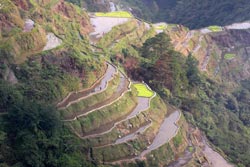LEGATO – a major international project on sustainable development of rice ecosystems in SE Asia

The Banaue Rice Terraces are 2000-year old terraces that were carved into the mountains of Ifugao in the Philippines. - LEGATO stands for ‘Land-use intensity and Ecological Engineering – Assessment Tools for risks and Opportunities in irrigated rice based production systems’ and aims to advance long-term sustainable development of irrigated rice fields, against risks arising from multiple aspects of global change. Photo: PD Dr. Josef Settele/UFZ<br>
LEGATO stands for ‘Land-use intensity and Ecological Engineering – Assessment Tools for risks and Opportunities in irrigated rice based production systems’ and aims to advance long-term sustainable development of irrigated rice fields, against risks arising from multiple aspects of global change.
The overall objective is the elaboration and testing of generally applicable principles within the frame of ecological engineering – an emerging discipline, concerned with design, monitoring and construction of ecosystems. Ecological engineering aims at developing strategies to maximize the ecosystem services through exploiting natural regulation mechanisms instead of suppressing them.
The project plans to quantify the dependence of ecosystem functions and the services they generate in agricultural systems in three countries in Southeast Asia: Malaysia (Muda Irrigation Scheme), Vietnam (Mekong Delta in the South and the Red River Valley along a transect from Sapa to Hanoi) and The Philippines (along a transect from Northern to Central Luzon). Apart from ecological and economic aspects, the work also has an important cultural component as there are long-standing human traditions in relation to rice cultivation with a wealth of traditional knowledge which are expected to be of core importance for the service provision assessments.
Josef Settele of the Helmholtz-Centre for Environmental Research – UFZ, Germany, is the project coordinator and will be leading a team of more than 60 ecologists, social scientists, engineers, and agronomists. The project has been granted total funding under the BMBF (German Federal Ministry of Education and Research) research programme “Sustainable Land Management” to the tune of €7.5 million. It will run from March 2011 to February 2016.
The project launch will take place at the start of the LEGATO kick-off meeting on Tuesday, the 14th of June 2011, 10:00 a.m., at Vistana Hotel, Georgetown, Penang Malaysia – under the responsibility of the Malaysian Agricultural Research and Development Institute (MARDI, Malaysia), The International Rice Research Institute (IRRI, the Philippines), CABI Southeast & East Asia (Malaysia) and the Helmholtz-Centre for Environmental Research (UFZ, Germany).
Pavel Stoev
http://www.pensoft.net/page.php?P=20
&
Tilo Arnhold
http://www.ufz.de/index.php?de=21328
For more details, contact:
Dr. Mohd Norowi Hamid
MARDI – Malaysian Agricultural Research and Development Institute
Director, Strategic Resource Research Centre
Email: norowi@mardi.gov.my
Dr. Kong Luen Heong
International Rice Research Institute, Los Banos, Philippines
Email: kheong@cgair.org
http://irri.org/kl-heong
PD Dr Josef Settele
Helmholtz Centre for Environmental Research (UFZ)
(preferably by email due to the launch related travel: Josef.Settele@ufz.de)
http://www.ufz.de/index.php?en=817
or
Tilo Arnhold, UFZ Press Office
Tel: +49 (0) 341 235 1635
Email: presse@ufz.de
Links:
Land use must be managed sustainably (UFZ-News, 2/2011)
http://www.ufz.de/index.php?de=21155
BMBF research programme Sustainable Land Management
http://nachhaltiges-landmanagement.de/
The adaptation to climate change, conflict between the supply of food and energy, demographic changes, and intensive land use for building development, transport and industry requires inventive solutions for the use of land and natural resources. Therefore, studies into land use are a major aspect of research at UFZ, which alongside a research project into rice landscapes in Southeast Asia is now coordinating and synthesising Module A of the BMBF (German Ministry of Education and Research) research programme entitled Sustainable Land Management (http://nachhaltiges-landmanagement.de).
At the Helmholtz Centre for Environmental Research (UFZ), scientists study the causes and repercussions of far-reaching environmental changes. They conduct research into water resources, biodiversity, the consequences of climate change and ways of adaptation, environmental engineering and biotechnology, bioenergy, how chemicals behave in the environment and their impact on human health, modelling, and aspects of the social sciences. The common theme of this diverse research is that it serves the sustainable use of natural resources and helps permanently protect these vital resources in the face of global change. At its sites in Leipzig, Halle and Magdeburg, UFZ currently employs about 1,000 people. It is financed by the German government as well as the governments of Saxony and Saxony-Anhalt.
http://www.ufz.de
The Helmholtz Association helps solve major, pressing challenges facing society, science and industry by means of first-rate research in six core fields: Energy, Earth and the Environment, Health, Key Technologies, the Structure of Matter, Transport and Space. With more than 30,000 employees at 17 research centres and an annual budget of some €3 billion, the Helmholtz Association is Germany’s biggest scientific organisation. Its work continues the heritage of scientist Hermann von Helmholtz (1821–94).
http://www.helmholtz.de/
Media Contact
More Information:
http://www.helmholtz.de/All latest news from the category: Ecology, The Environment and Conservation
This complex theme deals primarily with interactions between organisms and the environmental factors that impact them, but to a greater extent between individual inanimate environmental factors.
innovations-report offers informative reports and articles on topics such as climate protection, landscape conservation, ecological systems, wildlife and nature parks and ecosystem efficiency and balance.
Newest articles

Properties of new materials for microchips
… can now be measured well. Reseachers of Delft University of Technology demonstrated measuring performance properties of ultrathin silicon membranes. Making ever smaller and more powerful chips requires new ultrathin…

Floating solar’s potential
… to support sustainable development by addressing climate, water, and energy goals holistically. A new study published this week in Nature Energy raises the potential for floating solar photovoltaics (FPV)…

Skyrmions move at record speeds
… a step towards the computing of the future. An international research team led by scientists from the CNRS1 has discovered that the magnetic nanobubbles2 known as skyrmions can be…





















